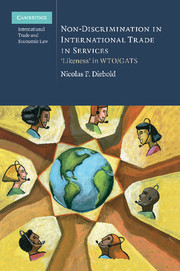Book contents
- Frontmatter
- Contents
- Foreword
- Acknowledgements
- Abbreviations
- List of Cases
- List of Legal Texts
- List of Documents
- Introduction
- PART I Foundations
- PART II Framing the conceptual breadth of ‘likeness’ in GATS
- PART III GATS specific ‘likeness’ issues
- PART IV Methodology for the ‘likeness’ analysis in GATS
- Bibliography
- Index
PART IV - Methodology for the ‘likeness’ analysis in GATS
Published online by Cambridge University Press: 10 January 2011
- Frontmatter
- Contents
- Foreword
- Acknowledgements
- Abbreviations
- List of Cases
- List of Legal Texts
- List of Documents
- Introduction
- PART I Foundations
- PART II Framing the conceptual breadth of ‘likeness’ in GATS
- PART III GATS specific ‘likeness’ issues
- PART IV Methodology for the ‘likeness’ analysis in GATS
- Bibliography
- Index
Summary
Having established the conceptual breadth of the GATS ‘likeness’ concept in part II and examined the relationship between the ‘service’ and the ‘supplier’ as well as between ‘modes’ and ‘methods’ of supply in the light of ‘likeness’ in part III, part IV turns to the actual analysis of ‘likeness’ in GATS with the aim of developing a methodology and criteria according to which the relationship of services and suppliers should be assessed. Chapter 13 analyses the obvious starting point, which is to consider the tests and criteria which have been developed under the jurisprudence of GATT ‘like products’ and determine whether this approach can be transposed to the assessment of ‘likeness’ in GATS. Subsequently, part IV looks beyond the WTO framework in order to assess whether similar concepts from other legal domains could provide for new methods to resolve ‘likeness’ in WTO law in general, and ‘likeness’ in GATS in particular. Consequently, chapter 14 draws a comparison between the concept of market definition in EU and US competition law and WTO ‘likeness’, arguing that the competition law approach would be particularly useful for the analysis of competitive relationships in service sectors under GATS. Chapter 15 examines to what extent the specific ‘like product’-related problem of PPM-measures may arise under GATS and whether the proposed methodologies are suitable to address this problem.
- Type
- Chapter
- Information
- Non-Discrimination in International Trade in Services‘Likeness' in WTO/GATS, pp. 243 - 244Publisher: Cambridge University PressPrint publication year: 2010



